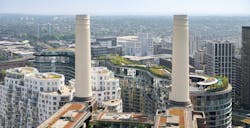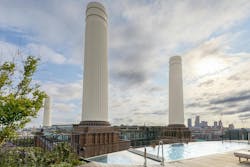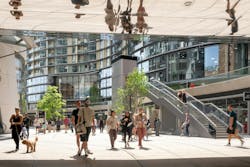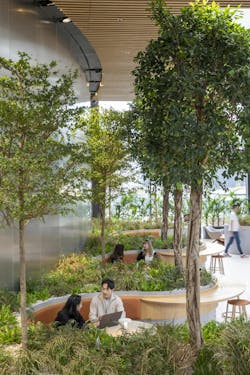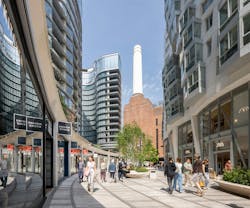Latest phase of London redevelopment completes two new buildings
By John Caulfield, Senior Editor
The recent completion of two Foster + Partners-designed buildings concludes Phase 3 of the Battersea Power Station masterplan, an eight-phase, $11.5 billion project that is transforming a 42-acre former brownfield site in London. At the heart of the project is the iconic coal-fired power station that opened in full in 1955 but was decommissioned in 1975 and vacated in 2014. The year before, a Malaysian investment consortium entered into an agreement with Ernst & Young to move forward on the redevelopment.
When this mixed-use redevelopment reaches the finish line, it will be home and workplace to 25,000 Londoners, supported by more than 250 retail, food, and beverage venues; a hotel, a medical center, and more than 19 acres of public space with just under 1,500 ft of frontage along the Thames River and a six-acre park. The office district within this redevelopment will have over 3 million sf of commercial space.
Rooftop garden one of the city’s largest
The neighborhood and business quarter that this redevelopment creates will be serviced by a Zone 1 extension to the London Underground Northern Line and the Phase 2 restoration of the Power Station into a mixed-use building that houses Apple’s London campus, retail stores, a cinema, a 24,000-sf food hall, a glass chimney lift, and hundreds of apartments. It opened on October 14, 2022, and is owned by the Malaysian investors.
Phase 3, which just completed, consists of six 17- and 18-story buildings with more than 900 housing units, constructed over a three-story basement. Gehry Partners designed five of the residential blocks, known as Prospect Place and The Flower. Foster + Partners designed the Battersea Roof Gardens building with 436 apartments and a 164-key art’otel London Battersea Power Station. The building is topped by a massive rooftop garden, designed by James Corner Field Operations, with 23,000 plants and 55 trees, as well as a grassy area for social gatherings.
Guests who stay at the hotel have access to their own rooftop garden with a lounge bar and infinity pool that overlooks the power station’s signature chimneys. A Sky Lounge on the 14th and 15th floors features a sunset bar, workspaces, cinema room, and areas for relaxation. Penthouse apartments have their own 3,350-sf private terraces.
Gebrüder Schneider and Radeburger Fensterbau provided 6,500 aluminum elements for the building’s 52,000-sm wave-shaped facade.
Connecting the buildings to the city
Foster + Partners also designed 50 Electric Boulevard, on the south side of the neighborhood, with approximately 200,000 sf of new office space over 13 above-ground floors, as well as over 100 shops, bars, restaurants, and leisure venues.
Positoned between these two buildings is a double-height pavilion, called the Light Box, with a 240-person capacity for private and communal functions, illuminated by roof lights and appointed by lush greenery. The lobby of 50 Electric Boulevard connects to a pedestrian thoroughfare known locally as a High Street. Underneath 50 Electric Boulevard is a new entrance to the Battersea Power Station subway stop; that entrance will be open by next spring.
“Our scheme plays an integral role in creating a brand=new neighborhood for London, and most importantly, it connects the iconic power station to the city that surrounds it,” said Grant Booker, Foster + Partners’ Head of Studio Andy Bow, a Senior Partner at the firm, added that Electric Boulevard “acts as a gateway” to the power station from the subway.
Buro Happold provided multi-disciplinary engineering services across Phase 3. On its website, the firm stated that the geometry of the Gehry buildings is complex, leading to each floor slab having a different plan shape. The structure of the Battersea Rooftop Gardens building is broken up with a series of high-level garden spaces, which cut through the building, creating challenging structural demands.
